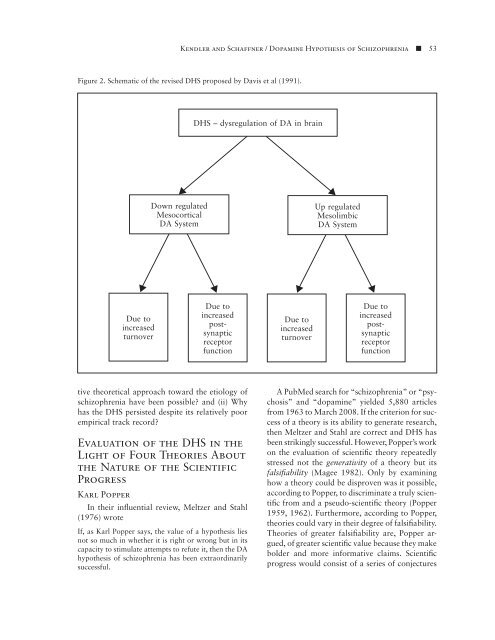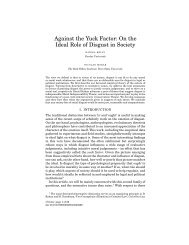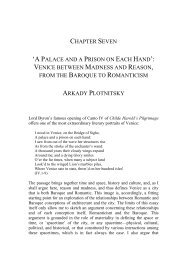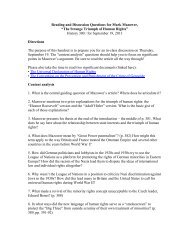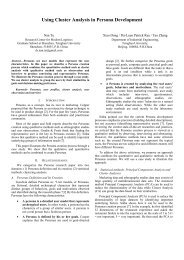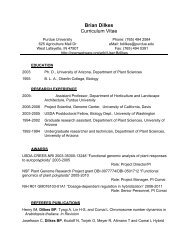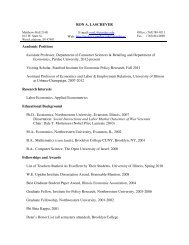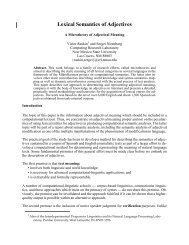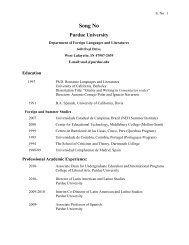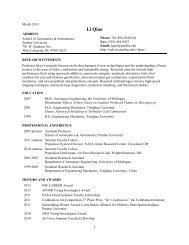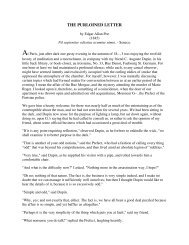The Dopamine Hypothesis of Schizophrenia: An Historical and ...
The Dopamine Hypothesis of Schizophrenia: An Historical and ...
The Dopamine Hypothesis of Schizophrenia: An Historical and ...
You also want an ePaper? Increase the reach of your titles
YUMPU automatically turns print PDFs into web optimized ePapers that Google loves.
Kendler <strong>and</strong> Schaffner / <strong>Dopamine</strong> <strong>Hypothesis</strong> <strong>of</strong> <strong>Schizophrenia</strong> ■ 53<br />
Figure 2. Schematic <strong>of</strong> the revised DHS proposed by Davis et al (1991).<br />
DHS – dysregulation <strong>of</strong> DA in brain<br />
Down regulated<br />
Mesocortical<br />
DA System<br />
<br />
Up regulated<br />
Mesolimbic<br />
DA System<br />
Due to<br />
increased<br />
turnover<br />
Due to<br />
increased<br />
postsynaptic<br />
receptor<br />
function<br />
Due to<br />
increased<br />
turnover<br />
Due to<br />
increased<br />
postsynaptic<br />
receptor<br />
function<br />
<br />
<br />
tive theoretical approach toward the etiology <strong>of</strong><br />
schizophrenia have been possible? <strong>and</strong> (ii) Why<br />
has the DHS persisted despite its relatively poor<br />
empirical track record?<br />
Evaluation <strong>of</strong> the DHS in the<br />
Light <strong>of</strong> Four <strong>The</strong>ories About<br />
the Nature <strong>of</strong> the Scientific<br />
Progress<br />
Karl Popper<br />
In their influential review, Meltzer <strong>and</strong> Stahl<br />
(1976) wrote<br />
If, as Karl Popper says, the value <strong>of</strong> a hypothesis lies<br />
not so much in whether it is right or wrong but in its<br />
capacity to stimulate attempts to refute it, then the DA<br />
hypothesis <strong>of</strong> schizophrenia has been extraordinarily<br />
successful.<br />
A PubMed search for “schizophrenia” or “psychosis”<br />
<strong>and</strong> “dopamine” yielded 5,880 articles<br />
from 1963 to March 2008. If the criterion for success<br />
<strong>of</strong> a theory is its ability to generate research,<br />
then Meltzer <strong>and</strong> Stahl are correct <strong>and</strong> DHS has<br />
been strikingly successful. However, Popper’s work<br />
on the evaluation <strong>of</strong> scientific theory repeatedly<br />
stressed not the generativity <strong>of</strong> a theory but its<br />
falsifiability (Magee 1982). Only by examining<br />
how a theory could be disproven was it possible,<br />
according to Popper, to discriminate a truly scientific<br />
from <strong>and</strong> a pseudo-scientific theory (Popper<br />
1959, 1962). Furthermore, according to Popper,<br />
theories could vary in their degree <strong>of</strong> falsifiability.<br />
<strong>The</strong>ories <strong>of</strong> greater falsifiability are, Popper argued,<br />
<strong>of</strong> greater scientific value because they make<br />
bolder <strong>and</strong> more informative claims. Scientific<br />
progress would consist <strong>of</strong> a series <strong>of</strong> conjectures


